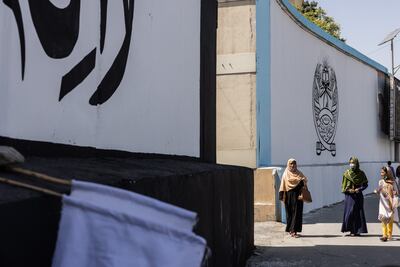Two Taliban fighters sit waiting for fruit juice, guns resting on their legs, while children play on the pavement in front of them and shops turn on their bright neon lights as the sun sets over the Hindu Kush Mountains.
Men sell balloons and popcorn in the evening breeze as children’s hands reach out of rolled-down car windows. It seems like a scene from any other Kabul night - save for the newly arrived fighters.
One month ago, the Taliban took the Afghan capital following a major offensive, with provinces falling one after the other as then-president Ashraf Ghani and most of his Cabinet took flight.
The Afghan army largely surrendered or fled as well. Despite the $83 billion invested in the Afghan security forces, many soldiers hadn’t received their salaries in months and the government frequently played down the numbers of lives lost.
The Taliban took Kabul, which has a population of six million, without facing much of a fight. They later announced an interim government made up of all men, mostly ethnic Pashtuns, with only a handful of Tajiks and Uzbeks and no member of the Hazara ethnic minority.
Former president Hamid Karzai and Dr Abdullah Abdullah, chairman of the High Council for National Reconciliation, both of whom had been in negotiations with the Taliban, have since effectively been put under house arrest.
The group has set up checkpoints throughout the city, some of their fighters squatting in houses of those who left the country in a rush, others drinking juice and eating ice cream alongside locals, who have little choice but to tolerate the new, armed residents.
Many of the Talibs now in Kabul have come from rural provinces - from Zabul and Kunar, Badakhshan and Farah - curious to visit the capital for the first time, exploring the previously unknown city's amusement parks, playing with animals at the zoo and frequenting the many restaurants.
They roam freely while many people who’ve lived in Kabul all their lives have gone into hiding or avoid public outings. Hundreds of thousands have left altogether.
Nargis, a 26-year-old former employee of the Ministry of Women’s Affairs, told The National that, one month into the new regime, little had changed for her. She is still living in fear, hopeless for the future.

“The Taliban have quickly revealed their true faces: we hear of abductions and beatings of journalists. The media is censored and phone networks are turned off. This is scary and gives us a glimpse of what’s ahead,” she said during a phone call, too afraid to meet in person.
Nargis, who spoke to The National under condition of anonymity, still hopes to leave her country, saying there is no place for women like her. “I’m unemployed now,” she said.
A few armed Talibs stand guard at the Ministry of Women’s Affairs, an agency that won’t be part of the new administration. Instead, the feared Ministry for the Propagation of Virtue and the Prevention of Vice is back, responsible for enforcing adherence to Sharia across the country.
The Ministry of Higher Education also announced an adjusted school curriculum, with acting minister Shaikh Abdul Baqi Haqqani saying that “each subject that is against Islamic law will be removed” and that girls and boys will not be allowed to study together.
activist
A month on, the city’s new residents continue to stand out. They have even sought to change the face of the city, painting over its colourful murals and hopeful poems, and replacing them with victory slogans and Islamic verses.
With the black-and-white “Islamic Emirate” flag flying over the city, people’s fears and suspicions remain.
Now that the airport is once again open to international flights, many people, among them activists and former government employees, are once again plotting their escape, willing to live in a foreign country as a refugee in exchange for safety.
Others are determined to stay.
Zahra, a 22-year-old activist living in west Kabul, a once vibrant part of town full of now-closed restaurants and coffee shops, says she will not bow to the new orders “under [any] circumstances, even if they kill me”.
She has been protesting in recent weeks and said she will continue to do so, though she worries about repercussions for her family. If her parents and siblings were safe and out of the country, she says she would fight even harder.
“The Taliban is not allowing our protests because they are afraid of our voices. They previously silenced women, but now, 20 years later, they didn’t expect us to keep shouting and fighting. We will not stop, and we will not leave Afghanistan, even if we die,” she said.







